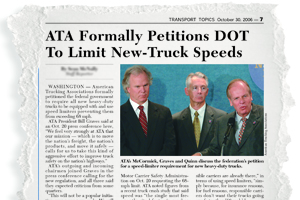Proposed Speed Limiter Rule Due by Fall, Foxx Tells Senate

This story appears in the April 27 print edition of Transport Topics.
Under pressure from Congress and trucking industry leaders, Transportation Secretary Anthony Foxx told a congressional subcommittee last week a proposed rule mandating speed limiters for heavy trucks will be issued no later than this fall.
The impetus for the mandate dates back to 2006, when American Trucking Associations and Road Safe America submitted petitions to the government, saying the mandate would make highways safer and reduce fuel consumption.
Foxx made the statement in response to questioning from Sen. Susan Collins (R-Maine), chairman of the Subcommittee on Transportation, Housing, and Urban Development, who said the rule has “lingered” in the department since 2011 and been delayed 21 times.
Foxx attributed the delays in part to needed safety data and safety benefits research to support the rule.
“Of course, some of it predates me, but I can tell you that, from the agency perspective, there has been a lot of work done to quantify the safety benefits in terms of crashes, injuries and fatalities that would be prevented,” Foxx told the subcommittee April 22.
Collins said speed limiters would be an important way to reduce highway fatalities.
“This is something that the trucking industry itself has petitioned the department for, and the department has received literally thousands of comments in support of the petitioners’ request,” she said.
The proposal is being written by the National Highway Traffic Safety Administration and the Federal Motor Carrier Safety Administration.
In 2006, ATA asked the agency to require heavy trucks not only to install the speed limiters, also known as governors, but to limit truck speeds to 68 mph. In 2008, it adjusted the request to reduce truck speeds to 65 mph.
Earlier this month, ATA leaders renewed their request that DOT act quickly to issue the proposed rule.
“We waited patiently until the government finally said in January 2011 they would move ahead with a speed limiter mandate, but this common-sense regulation has been mired in bureaucracy for over four years now,” ATA President Bill Graves said in a statement. “It is long past time for NHTSA and FMCSA to move ahead with this rule.”
ATA said that federal data show that driving too fast for conditions or over the posted speed limit was the primary reason for 18% of all fatal crashes where a large truck was deemed at fault.
“In addition to slowing truck speeds, ATA believes in slowing down all traffic,” Graves said. “That’s why we back a national speed limit for all vehicles of 65 mph and are disturbed by the recent trend of states raising their speed limits to 70, 75, 80 or in some areas even 85 mph.”
Dave Osiecki, ATA’s chief of national advocacy, said there are no major technological challenges to adopting a mandate.
“Every new truck has an engine control module, a part of which can be set to limit the top speed of a truck,” Osiecki said. “This is a policy call — simply, ‘Should we do it as the government, and if we do it, what’s the number?’ ”
Despite that support for the mandate, the Owner-Operator Independent Drivers Association opposes speed limiters.
“We think that speed limiter should be an intelligent, well-trained, experienced person behind the wheel,” said Todd Spencer, OOIDA’s executive vice president.
“We see no justification for equipping trucks where they’re simply rolling roadblocks, engaged in elephant races going down the road, aggravating motorists and promoting road rage,” he added, “and we certainly see no safety benefit whatsoever.”
But investigators with the National Transportation Safety Board and researchers with the Insurance Institute for Highway Safety disagree.
As early as 2012, NTSB recommended that NHTSA issue a mandate for speed limiters on buses and heavy trucks. In an investigation of a fatal New York bus crash, NTSB said speed limiters are commonly used for their “safety contribution, as well as to reduce tire wear and increase fuel efficiency.”
“The NTSB recommends that NHTSA develop performance standards for advanced speed-limiting technology, such as variable speed limiters and intelligent speed adaptation devices, for heavy vehicles, including trucks, buses and motor coaches,” the accident investigation report said.
Staff Reporter Eugene Mulero contributed to this story.

